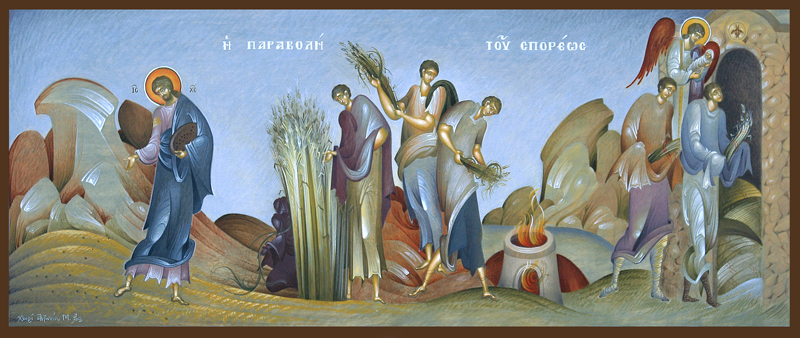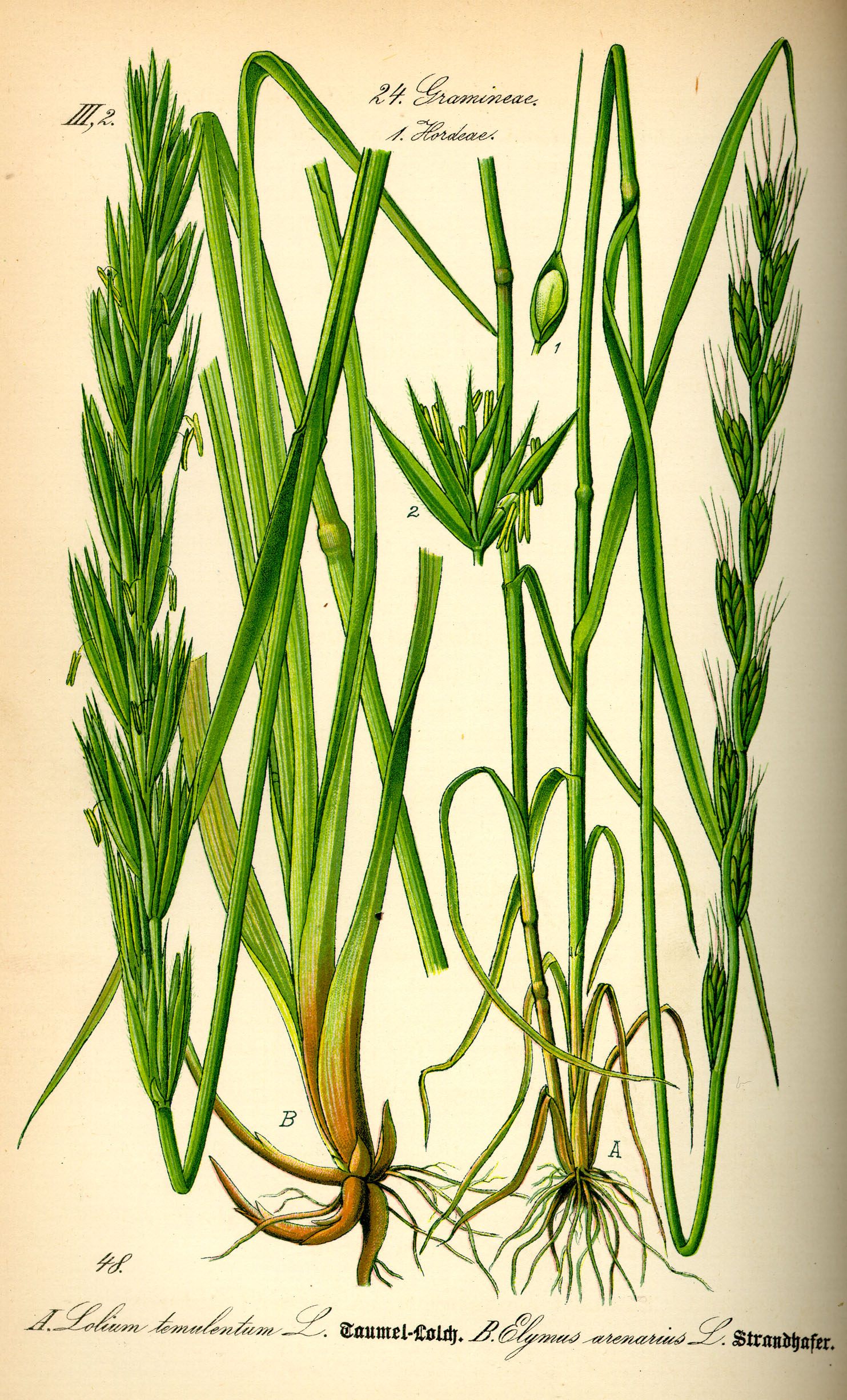Time to Pull the Weeds? Or Not—Lectionary Reflection for Pentecost 8A/Proper 11A (Matthew 13)
Matthew 13:24-30, 36-43 New Revised Standard Version Updated Edition
24 He put before them another parable: “The kingdom of heaven may be compared to someone who sowed good seed in his field, 25 but while everybody was asleep an enemy came and sowed weeds among the wheat and then went away. 26 So when the plants came up and bore grain, then the weeds appeared as well. 27 And the slaves of the householder came and said to him, ‘Master, did you not sow good seed in your field? Where, then, did these weeds come from?’ 28 He answered, ‘An enemy has done this.’ The slaves said to him, ‘Then do you want us to go and gather them?’ 29 But he replied, ‘No, for in gathering the weeds you would uproot the wheat along with them. 30 Let both of them grow together until the harvest, and at harvest time I will tell the reapers, Collect the weeds first and bind them in bundles to be burned, but gather the wheat into my barn.’”
36 Then he left the crowds and went into the house. And his disciples approached him, saying, “Explain to us the parable of the weeds of the field.” 37 He answered, “The one who sows the good seed is the Son of Man; 38 the field is the world, and the good seed are the children of the kingdom; the weeds are the children of the evil one, 39 and the enemy who sowed them is the devil; the harvest is the end of the age, and the reapers are angels. 40 Just as the weeds are collected and burned up with fire, so will it be at the end of the age. 41 The Son of Man will send his angels, and they will collect out of his kingdom all causes of sin and all evildoers, 42 and they will throw them into the furnace of fire, where there will be weeping and gnashing of teeth. 43 Then the righteous will shine like the sun in the kingdom of their Father. Let anyone with ears listen!
*************
The
previous week’s Gospel reading also came from Matthew 13. In that reading, we
heard Jesus tell the “Parable of the Sower.” The message of that parable could
be seen as evangelistic, at least in a way. What is interesting about this
parable is that when the sower went out to sow, the sower did so rather indiscriminately.
So, some fell on good soil and other seed fell among the rocks or the thorns or
even on the path. Depending on where it landed, the seed might or might not
bear fruit (produce grain). When Jesus interpreted the parable (allegorically),
he made it clear that the seed was the word or gospel. (Matthew 13:1-9; 18-23).
Having
told the Parable of the Sower, which spoke of good seed, that might or might
not bear fruit, Jesus tells a seemingly related, but quite different parable.
This parable has to do with a different kind of seed. It’s the kind of seed
that produces weeds. If you have planted a garden or tended one, you know
something about weeds. They seem to be rather resilient. No matter what you do,
they keep coming up. We can even prepare the ground by putting down new soil
and adding fertilizer that aids the growth of the plants and supposedly kills
the weeds. Yet, the weeds keep coming up. So, we go out and pull them up. But
as we do so, we may pull up the good plants. It is truly frustrating!
In this
story, the slaves of the householder (remember that in the first-century Roman
world, slaves were the primary workers, especially on large-scale farms), go
out to the field and to their horror find weeds popping up everywhere. They don’t
know how it happened. They asked their master: “Did you not sow good seed in
your field?” So, how can there be so many weeds? The Master responded by
telling them that an enemy had snuck in during the night and sowed weeds among the
wheat. So the next question had to do with a response. What are we to do with
these weeds? Do you want us to go out and pull up the weeds? The Master told them
that this wouldn’t be a good idea, because in pulling up the weeds they might
pull up the wheat. So, they should let the two grow up side by side until
harvest time. When they took in the harvest, then they could separate out the
weeds, tie them in a bundle, and throw them into the fire. Maybe you do
something like that with your weeds? I put them in a bucket or bag and the
trash folks come by and take the rubbish away.
When it
comes to growing grain for harvest, the Master’s guidance makes sense, though
by leaving the weeds in the ground, the weeds could choke out the grain. In
this case, the Master has counted the cost and decides it’s better to leave the
weeds until they can be separated out at the harvest. While the weeds might
threaten the more desirable grain, according to the Master in this parable,
pulling up the grain with the weeds is a larger problem. I’m not a farmer, so I
won’t argue with Jesus.
Of
course, the parable isn’t about farming. It’s about how the realm of God
spreads. The message here has to do with the presence of both the righteous and
the unrighteous within the community of faith. While attempts have been undertaken
throughout history to weed out the bad folk, that never goes well. Rooting out
heretics has led to unfortunate consequences for members of faith communities. Every
church indeed has a few “weeds” in its midst. Every pastor has encountered
them. Of course, sometimes the weed can be the pastor. Such people can cause
numerous problems and can be disruptive, but what are you to do? So, while the
church will likely contain people who can give the church a bad name, what
should we do? After all, one of the
reasons given for why people are leaving the church or not even giving it a try
is that there’s too much hypocrisy within the institutional church. If only
there weren’t any hypocrites, then they would consider joining up.
The
desire to create pure faith communities has been with us from the beginning. We
can find it in both conservative and liberal communities. Fights over important
concerns, like marriage equality, women in ministry, and civil rights, can be
divisive. But, should the church seek to remove people who disagree with the
direction taken by the church? Wouldn’t that be wise? If we get rid of the troublemakers,
then we can get on with our mission as the church. Besides, who made us judges?
By what authority do we seek to pull up the weeds sown by the enemy?
Back in
the fourth century, St. Augustine rejected the position of a puritanical
community known as the Donatists, who believed that the church should be
composed only of the righteous. They were very strict about this, even teaching
that if a priest/minister were unrighteous, their sacred acts, including
baptisms, were ineffective. Indeed, when unrighteous bishops ordained priests,
the sacraments administered by those priests were null and void. Augustine
responded to the Donatists, telling them that the church was holy not because
of the people who comprised it were holy, but because God is holy.
While I’m
sure church life would be more peaceful and productive if the people who cause
problems were absent, how do we weed out the bad without damaging the good? If
Paul is correct that none are righteous, then if we weed out all the
unrighteous there will be no one left. So, in the meantime, Jesus tells us to let
everyone grow up together lest the good get kicked out along with the bad. So,
here we are—a community that is a rather mixed bag of the morally impure and
the relatively pure. Now, for a caveat—some people should be removed. Jesus
gave guidelines as did Paul. We see this in the letters of John and James. So, if
a person poses a danger to the community or individuals in the community then something
will need to be done. We can think here of pedophiles and abusers, whether
physical, sexual, or verbal. They have no place in the community. With that
caveat in place, we can state clearly that the church is a gathering of the
imperfect.
In
Jesus’ interpretation/application of the parable, he first identifies the weeds
as the “children of the evil one,” who are placed in the community to oppose
the “children of the kingdom.” Scott Spencer, notes that “by clearly marking
out the ‘field’ of operation as the ‘world’ (v. 38), including but not
restricted to the righteous, Jesus depicts overlapping and interpenetrating
spheres of church and society. Matthew is the only Gospel writer who uses the
term “church” (see 16: 18; 18: 17) within the overarching arena of God’s cosmic
kingdom, where evil still challenges God’s righteous rule” [Connections: A
Lectionary Commentary for Preaching and Worship (p. 401). Kindle Edition].
This is a competition among sowers, so who will come out on top? Jesus’ word
about final judgment would suggest that God and not the Evil One will succeed,
but it won’t be easy.
As for the
final judgment, when it’s time for the harvest God will sort things out. The
question is, what will be the fate of the children of the Evil One? When it
comes to matters of judgment, those of us who have set aside the doctrine of Hell
must wrestle with the implications. Adherents of the idea of conditionalism/annihilationism
probably have the best claim to this passage, as it poses problems for those of
us who lean toward universalism. (These questions are dealt with in some
detail, from differing perspectives, both conditionalist and universalist, in
the collection of essays titled: Deconstructing Hell, Chad Bahl, ed.).
According
to Jesus, the weeds, the evil-doers, will be separated out by the angels. After
they’ve been gathered together they’ll be tossed into the fire where there is “weeping
and gnashing of teeth.” As for the righteous (the children of the kingdom),
they “will shine like the sun in the kingdom of their Father” (Mt. 13:41-43). While
the reference to the fire where weeping and gnashing of teeth is present
(whatever is meant here is unclear), both this parable and the preceding one
serve to remind us that God is at work, seeking to redeem this world. There is
opposition and resistance. There are seeds of evil present in this world, but
it will not, in the end, win the day. As Paul reminds us in 2 Corinthians 5:
So, if anyone is in Christ, there is a new creation: everything old has passed away; see, everything has become new! All this is from God, who reconciled us to himself through Christ, and has given us the ministry of reconciliation; that is, in Christ God was reconciling the world to himself, not counting their trespasses against them, and entrusting the message of reconciliation to us. (2 Cor. 5:17-19).
If we take Paul’s word here as reflecting the message of the
parables, our calling is to join the Sower in sowing seeds of the Gospel, while
the Son of Man and his angels take care of the harvest.
Image Attribution - Parable of the Sower, from Art in the Christian Tradition, a project of the Vanderbilt Divinity Library, Nashville, TN. https://diglib.library.vanderbilt.edu/act-imagelink.pl?RC=57429 [retrieved July 14, 2023]. Original source: https://commons.m.wikimedia.org/wiki/File:The_parable_of_the_sower.jpg - Fikos.


Comments